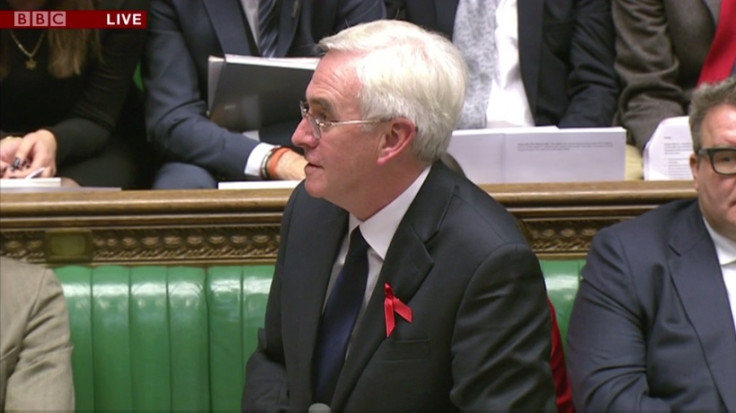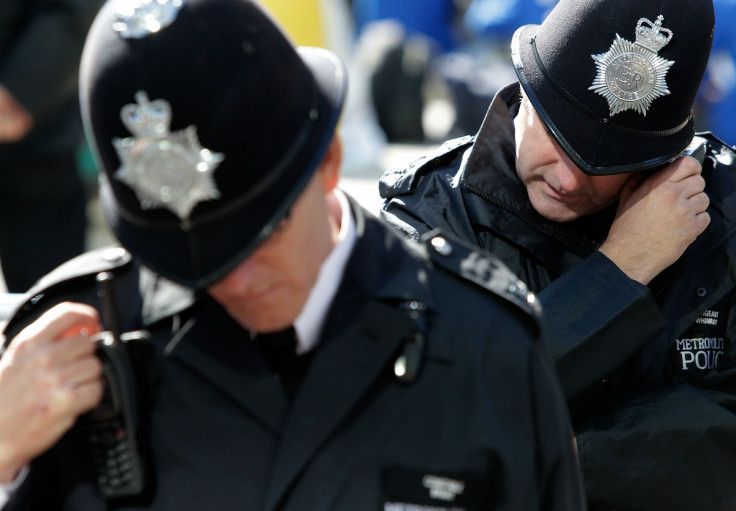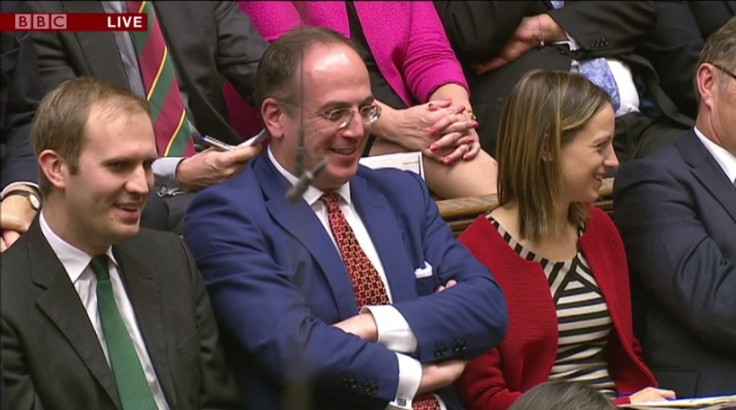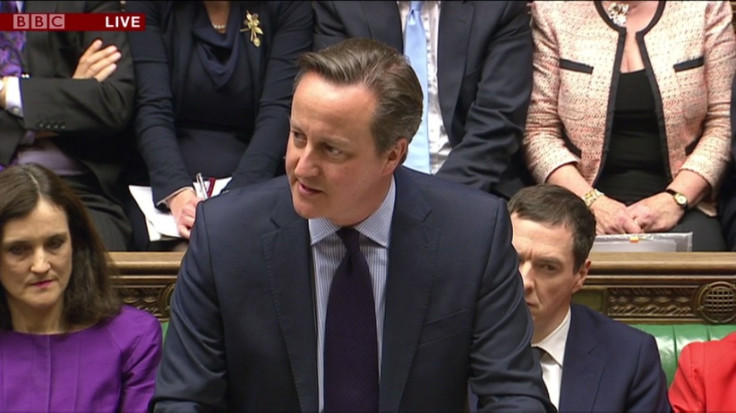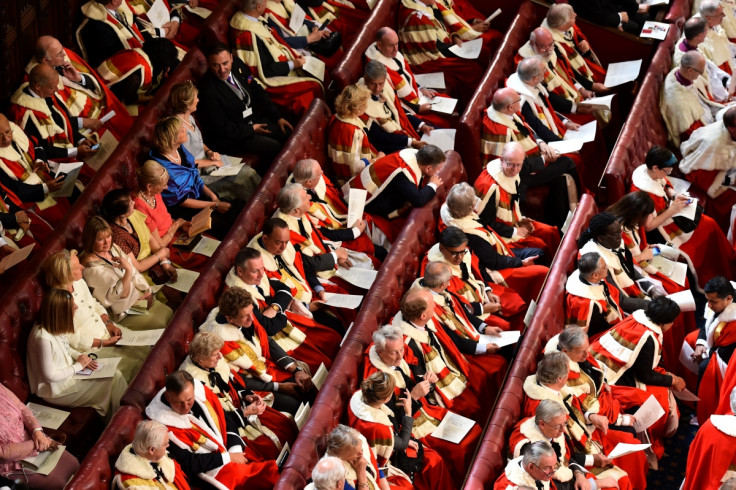Autumn Statement 2015 as it happened: George Osborne makes tax credit U-turn and spares police the axe
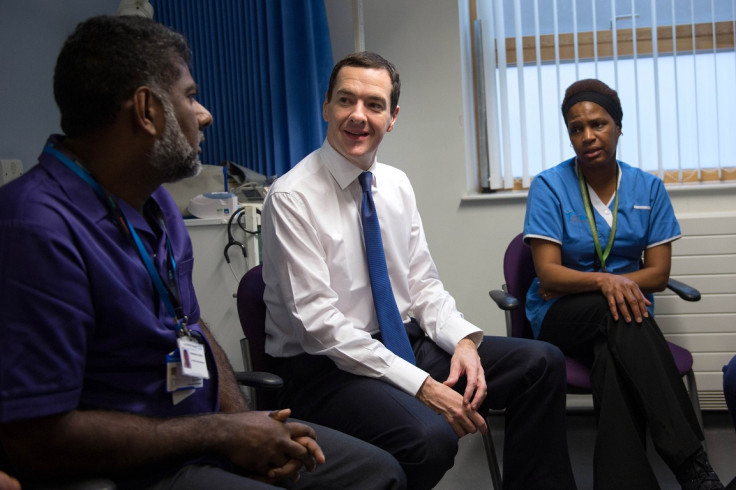
George Osborne takes to the dispatch box this afternoon (25 November) to make the first Autumn Statement since the Conservatives won an overall majority at the general election in May.
The chancellor met doctors and nurses at the Streatham High Practice in south London on 24 November as he pledged to increase spending by £3.8bn ($5.4bn) to protect the NHS and stave off a potential winter crisis.
Osborne was forced into a humiliating re-think over tax credits when peers in the House of Lords shot down Treasury plans to reform the benefit. But the Tory leadership front-runner vowed to return to the House of Commons with a plan to build "the low tax, low welfare, high wage economy" Britain needs.
Elsewhere, Osborne will confirm defence spending will remain at 2% of GDP, house building measures are expected to be unveiled, and we'll hear more on plans to create a surplus of £10bn by 2020.
Then there is policing, which MPs have warned must not bear the brunt of cuts in the wake of the Paris terrorist attacks. Osborne, however, is determined to stay the course on Home Office budget cuts and will announce an increase in counter-terrorism funding of 30% to offset savings.
Make sure to follow @IBTUKPolitics and @IBTUKBiz for all the news, views and reaction.
What you need to read
- Where to watch PMQs
- The Autumn Statement preview
- What small businesses want from Osborne
- Chancellor will condemn women to violence on White Ribbon Day
- Housebuilders rally as George Osborne is set to boost private developers
- John McDonnell faces first big test as Labour shadow chancellor
- George Osborne drops tax credit cuts after House of Lords defeat
- Tampon Tax money to be donated to women's charities
That concludes our live blog of today's Autumn Review and Spending Review. Continue to follow IBTimes UK's coverage for all the reaction on the day George Osborne made a U-turn over tax credits, spared the Home Office of cuts to policing and guaranteed a half trillion pound investment in the NHS by 2020.
Geraint Johnes, professor of economics at Lancaster university, gives his take on Osborne's police funding announcement.
"George Osborne is adept at pulling a rabbit out of a hat as a grand finale, and he did not disappoint this year, with the announcement that real terms funding for the police would be protected," the academic said.
"That will doubtless take some of the wind out of the sails of the opposition. They might, instead, wish to focus on elements of the much weaker 'social failures' chunk of the statement."
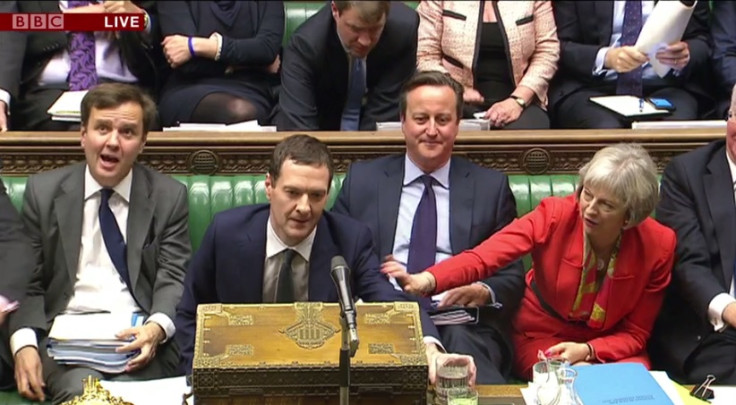
Osborne closes with: "We were elected as a one nation government and today we deliver the spending review of a one nation government
!The guardians of economic security the protectors of national security, the builders of our better future, this government the mainstream representatives of the people of Britain.!
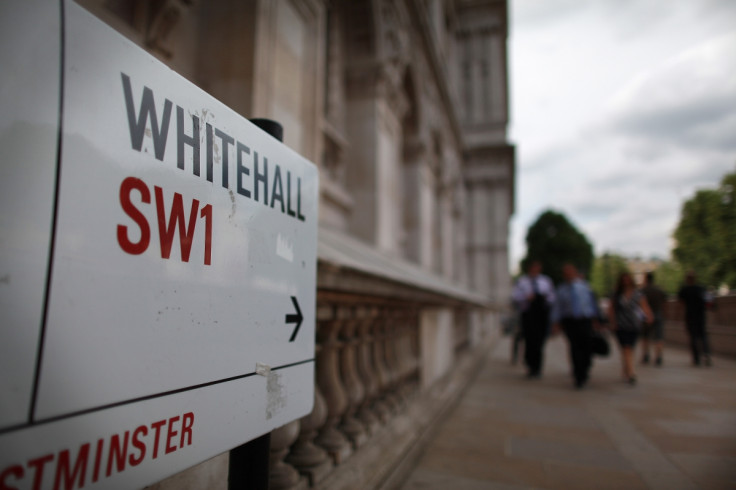
Simon Colvin, Partner at Pinsent Masons law firm, believes cuts to government departments could be achieved by sharing services.
"Increased outsourcing and offshoring, greater use of shared services, and alternative commercial and contract models are likely to be means by which spending can be streamlined, but it's going to require flexibility and willingness to adapt by both government and its suppliers."
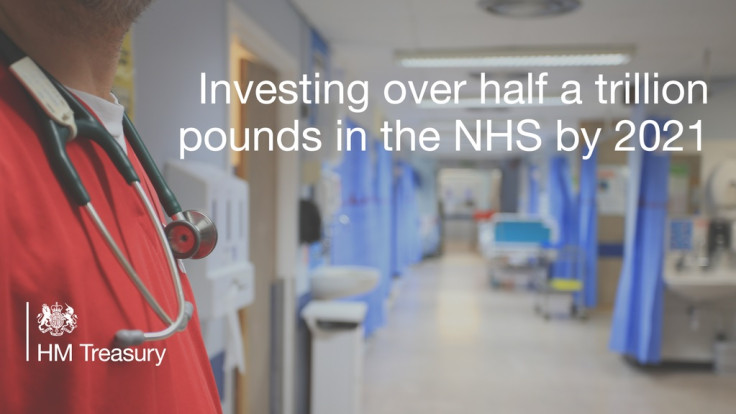
Osborne commits £101bn to the NHS this year, rising to £120bn in 2020/2021. He says the half trillion pound commitment this parliament is "the largest investment since its creation". There will also be £600m allocated to tackling mental health:
However, there is a sting in the tail as Osborne says the NHS must find £22bn in efficiency saving.
George Osborne makes a U-turn over tax credits. The Chancellor has decided to scrap plans that opponents said would leave families earning £20,000 out of pocket by £1,300.
"We still achieve the £12bn of welfare savings promise – but we have listened to concerns tax credits...the simplest thing to do is not to phase these changes in, but to avoid them altogether."
He goes on to say:
- He will create a surplus "so we don't borrow forever"
- "After longest period of rising debt in modern history, our debt will fall this year and every year that follows"
- Cuts will be "delivered in full and in a way that helps families as we make transition to National Living Wage"
- Britain will spend 0.7% of GDP on development and 2% on defence of the realm
On relations with Russia, Cameron said: "There are opportunities for sensible discussions with Russia about agenda in Syria and...a government that represents the people of Syria."
And commenting on the downed Russian fighter jet over Turkish air space, Cameron said the "facts are not clear" but it was important to "respect Turkey's rights to protect air space".
Islington South and Finsbury MP Emily Thornberry asks the prime minister if it is in the interests of her constituents that he cuts the Met Police.
Cameron says that "still too many people are carrying knives", which is not only against the law but an "enormous danger to themselves and others."
"When it comes to policing, what we have seen is an increase in Neighbourhood Policing and the Met has done a good job at cutting back office costs and putting officers back on our streets."
On a topic mentioned by IBTimes UK columnist Lydia Smith, Cameron has said George Osborne will pledge money towards women's charities, adding his government has a "good record on helping women and the crime of violence against women".
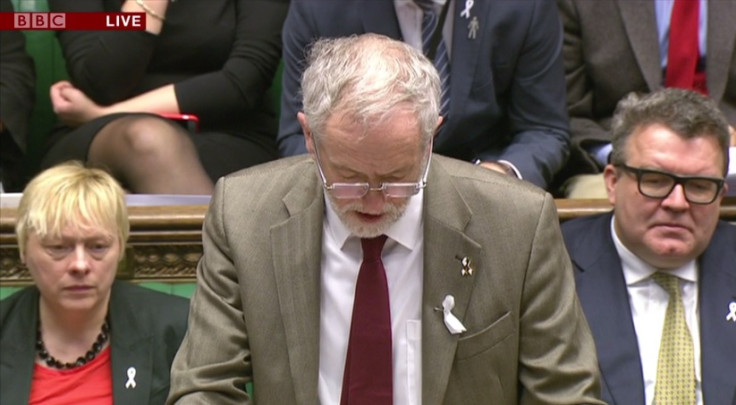
Labour leader Jeremy Corbyn is tackling Cameron's record on green issues and the loss of 1,000 jobs in the solar panel industry. The prime minister responds saying he has trebled wind power, will build the country's first nuclear power station in decades as well as doubling investment on renewable energy in this parliament. Cameron adds that 1m homes in last parliament were fitted with solar panels but that the cost cost of manufacturing has plummeted, hence the subsidy.
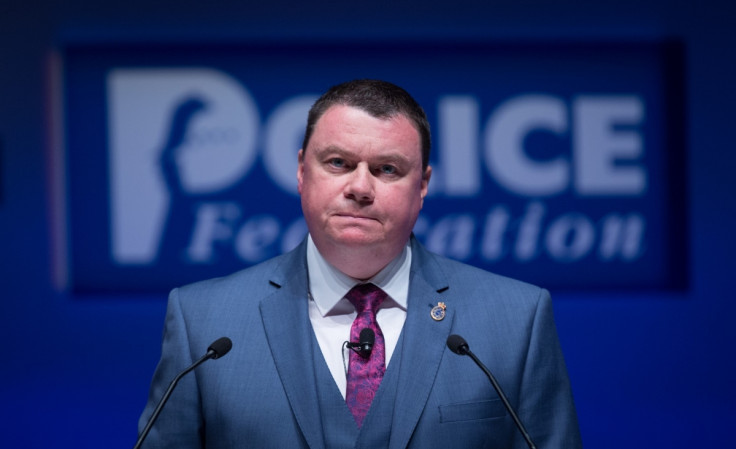
The chancellor has vowed to press ahead with cuts to policing but will go on to boost counter-terrorism funding by 30% in the wake of the terrorist attacks in Paris on 13 November.
In a letter to Home Secretary Theresa May, Police Federation chairman Steve White warned her not to "put a price on public safety".
"We all need to work together to combat terrorism, but pulling the rug from under the police service will not do this. Government must not sleepwalk into disaster," he wrote. White went on to write the federation welcomed the additional £2bn funding and recruitment plans for an extra 1900 staff for MI5, MI6 and GCHQ but that the union was "bitterly disappointed" there was no mention of policing.
"The cuts have so far resulted in the loss of 17,000 police officers and almost the equivalent number of support staff. The impact of this is already being felt across communities and officers are telling us they are struggling to cope as it is. Any further cuts could seriously jeopardise public safety."
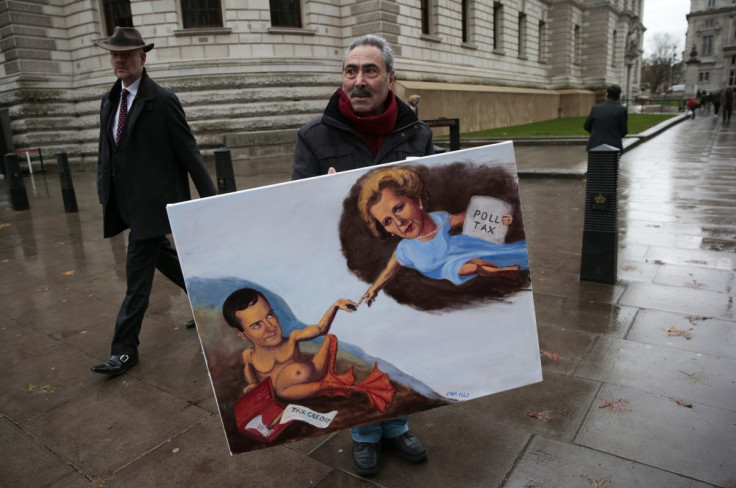
Away from Downing Street and near the Treasury, artist Artist Kaya Mar holds a painting depicting Chancellor George Osborne and former Prime Minister Margaret Thatcher. Reading between the lines, he thinks Osborne's tax credits will go down as his Thatcher's poll tax moment. The artist is well known for his satirical paintings of leaders.
In his first tweet ahead of the big announcement, George Osborne claims his plan will "deliver national and economic security."
Today's Spending Review will deliver economic and national security - the foundations for everything we do #SR15 pic.twitter.com/Fgstmgfm48
— George Osborne (@George_Osborne) November 25, 2015
Independent think tank, The Institute for Fiscal Studies (IFS), will be providing a live analysis of the Autumn Statement and Spending Review from 1pm GMT. Click the link for the livestream.
Ahead of the Autumn Statement we've put together a short observation highlighting some key issues #SR2015: https://t.co/39yxWJLXXd
— IFS (@TheIFS) November 24, 2015
Departments face cuts of between 25% and 40% in today's Spending Review but economists have warned that further austerity could actually increase the deficit.
Dr Kevin Albertson, Reader in Economics at Manchester Metropolitan University, explains: "In the term of the coalition government (2010-2015) the Chancellor instigated imposed cuts in the public sector and the economy began to slow – many economists would then argue that he took his foot off the austerity brake at some point in 2012, despite Osborne having stated he had no 'plan B'. The same might happen again.
"However, cuts reduce economic growth, which reduces the tax take. Therefore, depending on the scale of the relative contraction in the economy as austerity begins to bite, the deficit might actually increase. According to the IMF this might be the situation in which the UK finds itself. If this is the case, cuts on the scale the chancellor proposes risk economic contraction and increased borrowing."

IBTimes UK columnist Lydia Smith says Osborne's cuts will affect women "disproportionately hard" as more front-line women's services face closure. "Austerity is the very reason these services are struggling to stay afloat," she says.
Read the full piece here - Autumn Statement 2015: George Osborne's cuts will condemn women to violence on White Ribbon Day
If the FTSE 100 is anything to go by, investors are clambering over themselves to get hold of shares in the country's top house builders:

"The FTSE managed to eke out a 30 point jump as Wednesday got underway. The reason is likely some pre-Autumn Statement excitement; whilst most sectors are likely to suffer under George Osborne's giant scissors, the UK housing stocks may get a lift as the Chancellor recommits to 'solving' the current homes shortage," said Connor Campbell, financial analyst at Spreadex.
"Already the likes of Barratt Developments, Berkeley Group Holdings and Bellway have jumped around 2% this morning, emblematic of the rest of the sector, with potentially more gains to come."
Political Twitter is already having some fun ahead of the Autumn Statement. Meanwhile, everyone's favourite former Apprentice contestant keeps it controversial.
Morning. Forgive the following re-post but it's as traditional as Osborne shifting his deficit targets. #spendingreview
— David Schneider (@davidschneider) November 25, 2015
Spending review tomorrow. Time to cut foreign aid and reallocate it to the Home Office. #spendingreview
— Katie Hopkins (@KTHopkins) November 24, 2015
Analysts are predicting Osborne will pull a "pensions rabbit" from his hat today (the chancellor will almost certainly not wear a hat). Francois Barker, head of pensions at law firm Eversheds, will be keeping an eye on pensions tax relief.
"The key question in everybody's mind is how is the government is going to respond to its consultation on reforming the current system of pensions tax relief. A radical reform of the current system, which could see pensions treated in the same way as ISAs for tax purposes, would be portrayed as saving tens of billions of pounds in tax relief.
"It would have a massive impact on pension plans, employers, trustees and providers, but there are significant concerns that it could actually deter pension saving (if savers have to contribute out of taxed income) and not promote it as the Government has suggested."
For the history/head wear buffs out there, the last chancellor to wear a hat on Budget day was apparently Selwyn Lloyd in 1962:
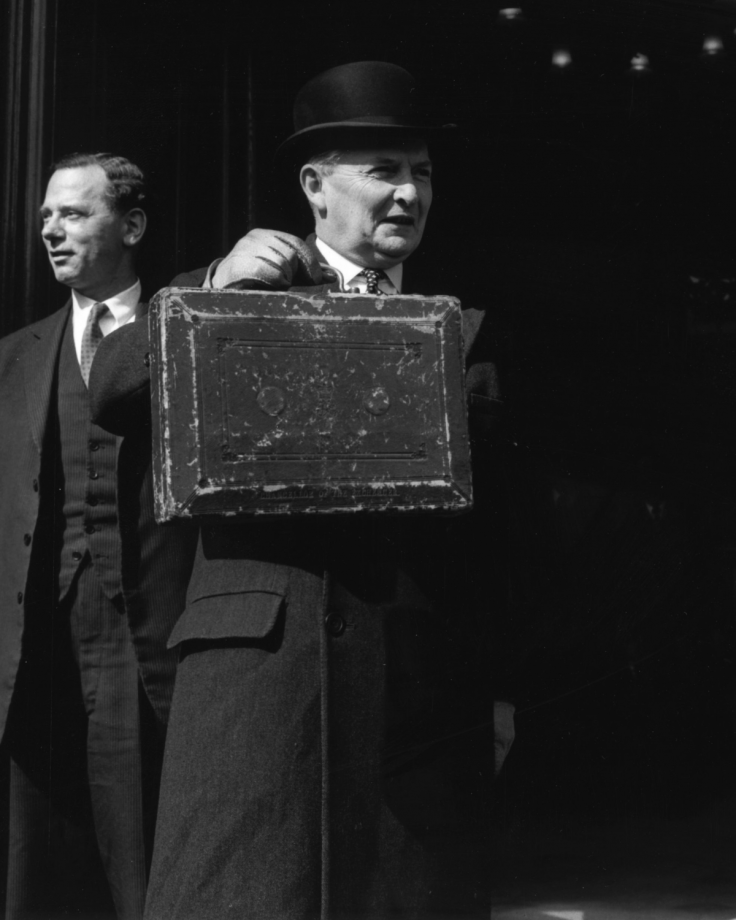

Connor Campbell, senior market analyst at www.spreadex.com, predicts housing stocks will rise on Osborne's promise to build 400,000 subsidised homes by the end of the decade.
"Whilst the all the Autumn Statement headlines have focused on the oncoming cuts, housing stocks are likely to benefit from the Osborne's reaffirmed promise to 'fix' the growing homes shortage," he said.
"Movements in pension, motor and oil stocks, meanwhile, could be dependent on announcements in regards to reform and fuel duty respectively. Finally there is the case of Osborne's infamous rabbits; out of his big red hat the Chancellor has pulled National Savings and Investments pensioner bonds, stamp duty reform, 'Help to Buy' ISAs and the living wage in the last few 'statements.'
"There may not be much wiggle room for Osborne to work with this time around, so it will be interesting to see what, if anything, he uses to sweeten another austere mini-budget."
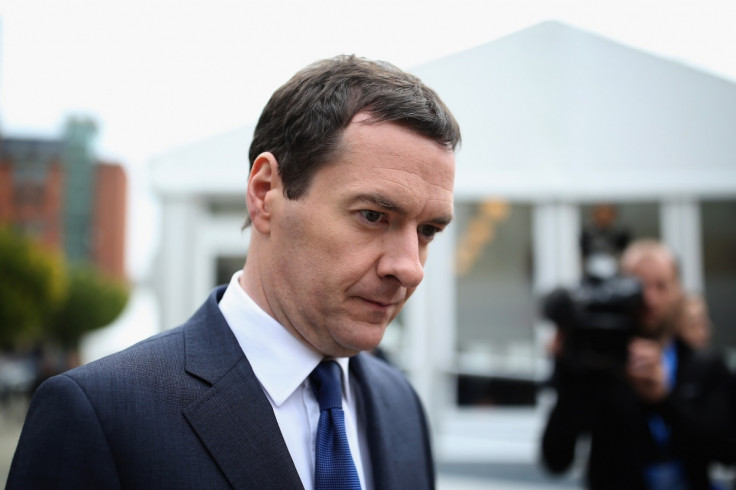
The Office for Budget Responsibility (OBR) is expected to revise up its forecast for the deficit this financial year, from £69.5bn to as much as £74bn. This comes after the October deficit soared 16% on last year. The fiscal watchdog also believes the government will borrow more this year, blowing a hole in Osborne's plans for a budget surplus in 2020.
Emma Boggis of the Sport and Recreation Alliance has warned of sports facility closures and recreational sport becoming more expensive under cuts announced in the Spending Review.
She told BBC Radio 4's Today programme that cuts to the department of Culture, Media and Sport would have a "significant impact" on sport and recreation. It was important for continued investment in sport, she said, but not at the expense of the arts.
In his Mansion House speech earlier this year, George Osborne announced he would enshrine into law that Britain would run a budget surplus during "normal times".
But as BBC political editor Laura Kuenssberg told Radio 4 this morning, his £10bn target could be under threat and the chancellor could revise that figure lower.
© Copyright IBTimes 2025. All rights reserved.



